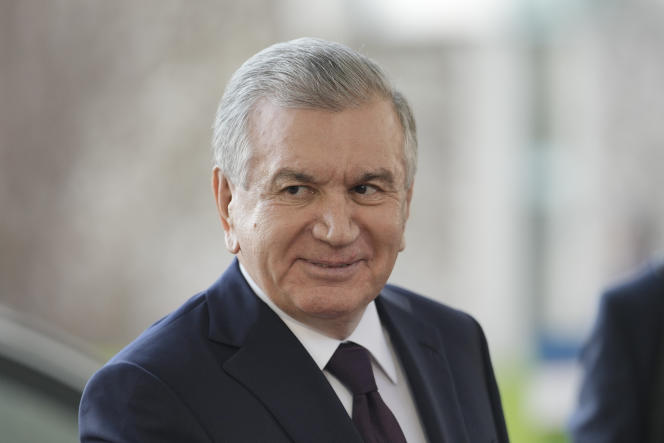
Shavkat Mirziyoyev is the current President of Uzbekistan
Shavkat Mirziyoyev is the current President of Uzbekistan, serving since 2016. He was previously the Prime Minister of Uzbekistan from 2003 to 2016.
Biography
Mirziyoyev was born on July 24, 1957, in Zaamin District, Jizzakh Region, Uzbekistan. He graduated from the Tashkent Institute of Engineers of Irrigation and Mechanization of Agriculture in 1981 with a degree in mechanical engineering. He then served in the Soviet Army for two years.
After leaving the army, Mirziyoyev worked as an engineer and then as a teacher at the Tashkent Institute of Irrigation and Mechanization of Agriculture. He entered politics in the early 1990s, and served as governor of several regions in Uzbekistan. In 2003, he was appointed Prime Minister by President Islam Karimov.
Mirziyoyev became Acting President of Uzbekistan in September 2016, following Karimov’s death. He was elected President in his own right in December 2016.
Activities, achievements, reforms, and prospects
Mirziyoyev has pursued a number of reforms since becoming President, including economic reforms, political reforms, and social reforms. He has also taken steps to improve Uzbekistan’s relations with its neighbors and with the West.
Some of Mirziyoyev’s key achievements include:
- Liberalizing the economy and reducing government regulation.
- Improving the investment climate and attracting foreign investment.
- Reducing poverty and improving living standards.
- Improving human rights and religious freedom.
- Strengthening Uzbekistan’s regional and international ties.
Mirziyoyev’s reforms have been welcomed by many Uzbeks and by the international community. However, there are still some challenges that need to be addressed, such as corruption, bureaucracy, and a lack of political pluralism.
Overall, Mirziyoyev is a popular and respected leader who has brought about significant positive changes in Uzbekistan. His reforms are likely to continue in the years to come, which will further improve the lives of the Uzbek people.
Prospects
President Mirziyoyev has outlined a number of ambitious goals for Uzbekistan in the coming years, including:
- Doubling the country’s GDP by 2030.
- Creating 10 million new jobs by 2030.
- Reducing poverty to 5% by 2030.
- Becoming a fully developed country by 2050.
These goals are ambitious, but achievable. Uzbekistan has a young and growing population, and a rich endowment of natural resources. With continued reforms and investment, Uzbekistan has the potential to become a major economic and political power in Central Asia.
Shavkat Mirziyoyev is the President of Uzbekistan. He assumed office on December 14, 2016, following the death of the country’s first President, Islam Karimov.
Biography: Shavkat Mirziyoyev was born on July 24, 1957, in Jizzakh, Uzbek SSR, Soviet Union (now Uzbekistan). He studied engineering and economics at the Tashkent Institute of Irrigation and Melioration and later pursued further education in Moscow. He held various positions in the regional and national government throughout his career.
Activities and Career: Before becoming President, Mirziyoyev held several significant positions in the Uzbek government. He served as the Prime Minister of Uzbekistan from 2003 to 2016, a role in which he was responsible for overseeing the government’s economic and social policies.
As President, Mirziyoyev has focused on a wide range of reforms aimed at modernizing and opening up Uzbekistan to the world. These reforms encompass economic, social, political, and cultural domains.
Achievements and Reforms:
- Economic Reforms: Mirziyoyev has implemented a series of economic reforms to attract foreign investment, improve the business climate, and diversify the economy. These reforms include simplifying administrative procedures, tax reforms, and efforts to privatize state-owned enterprises.
- Diplomatic Outreach: The President has pursued a more open and cooperative foreign policy, engaging with neighboring countries and other nations to strengthen diplomatic ties and increase regional cooperation.
- Human Rights and Civil Liberties: There have been efforts to improve human rights and civil liberties, including the release of political prisoners and efforts to address issues of torture and forced labor.
- Education and Healthcare Reforms: Mirziyoyev has initiated reforms in education and healthcare, focusing on improving the quality of education, modernizing healthcare facilities, and addressing issues such as child malnutrition.
- Agricultural Reforms: Reforms in the agricultural sector have aimed to increase agricultural productivity, promote modern farming techniques, and improve access to credit and resources for farmers.
- Legal Reforms: Legal reforms have been introduced to enhance the independence of the judiciary and improve the legal system to provide a more just and transparent legal environment.
Prospects: As of my last update in September 2021, President Mirziyoyev’s leadership was still ongoing, and his reform agenda was actively being pursued. The long-term prospects would depend on how successful his administration is in implementing and sustaining these reforms, fostering economic growth, improving human rights, and enhancing Uzbekistan’s global standing. However, for the most up-to-date information on Shavkat Mirziyoyev and the current state of Uzbekistan, I recommend referring to the latest and reliable sources available as of your current date.